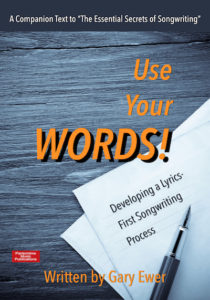Believe it or not, the specific topic of a song isn’t all that crucial to its success. “Hotel California” is a hugely popular song from the 70s, and there were considerable debates at the time of its release as to what it was actually about. The confusion of listeners didn’t damage the listeners’ ability to enjoy the song, and may have even enhanced it.
There are many other songs where the actual topic is hard to identify, where that difficulty didn’t get in the way of audience enjoyment – “I Am the Walrus” (Lennon & McCartney), for example.
 Are you ready to have LYRICS take a much more important role in your songwriting process. You need to read “Use Your Words! Developing a Lyrics-First Songwriting Process.” Right now, it’s FREE with your purchase of “The Essential Secrets of Songwriting 10-eBook Bundle.”
Are you ready to have LYRICS take a much more important role in your songwriting process. You need to read “Use Your Words! Developing a Lyrics-First Songwriting Process.” Right now, it’s FREE with your purchase of “The Essential Secrets of Songwriting 10-eBook Bundle.”
The lyric may be a jumble of words, making the topic hard to discern, but if every once in a while there’s a phrase that makes an emotional connection to the audience, that’s what really matters.
An example, from “The Gates of Delirium” (Yes):
Wars that shout in screams of anguish
Power spent passion bespoils our soul receiver, surely we know
In glory we rise to offer
Create our freedom, a word we utter
A word
That’s a very poetic lyric, and if you’re into understanding your songs on one or two listens, this kind of lyric may frustrate you. But if you look through that excerpt of lyric, you’ll find bits that seem lucid and meaningful, even if they only give a very faint glimpse of the actual larger meaning: “screams of anguish”, “surely we know”, “we rise”, “freedom”, etc. The meaning of those fragments will outweigh the meaning of the entire lyric.
Song topics, though, are important, because people generally like to feel a connection to whatever the song’s about. “I Am the Walrus” is a rare example of a song with apparently no obvious topic, but maybe that’s its charm. And I’m not sure the rest of us could get away with it.
In your own lyric writing, my advice would be:
- Choose a topic that you think has a good chance of expressing something in the likely experience of your listeners. That’s why so many songs are about friendship, love, parties, relationships, etc.
- Focus more on word choice in your lyrics rather than obsessing over your song’s topic. Sometimes a topic may seem simplistic (“She dumped me at the party”), but it’s the words you choose, the imagery, the succinct expression of emotion, that make the real impact, and can make for a successful song.
- In successive songs, try to find topics that allow for different emotions to come forward. It’s a problem if every song you write is about your love life, especially if they are all basically saying the same thing. Dig down into a vague topic (she dumped me at the party) to find something more interesting, more in-depth… a different angle perhaps.
Another solution: If you find all of your songs are based on a similar song topic with similar kinds of lyrics, don’t just focus on changing the topic. Try changing other bits about the song as well: the tempo, key (major or minor), and instrumentation.
All of those kinds of changes can make two songs with very similar topics and lyrics sound very different from each other, and that of course is a good thing.
 Written by Gary Ewer. Follow Gary on Twitter
Written by Gary Ewer. Follow Gary on Twitter
 Thousands of songwriters are using “The Essential Secrets of Songwriting” eBook bundle to polish their songwriting technique. Every aspect of how to make a song better is covered. Stop wasting time — take your songwriting technique to a new level TODAY. Ten eBooks, plus a free one: $37 USD (Immediate download).
Thousands of songwriters are using “The Essential Secrets of Songwriting” eBook bundle to polish their songwriting technique. Every aspect of how to make a song better is covered. Stop wasting time — take your songwriting technique to a new level TODAY. Ten eBooks, plus a free one: $37 USD (Immediate download).











Lots of truth here. Songs like “I Am the Walrus” only seem possible for established stars like John Lennon. He couldn’t have gotten it planned Ed on radio in 1963. I’ve often considered how successful “After the Gold Rush” might have been if it were Neil Young’s very first recorded song. Being famous and successful appears to give you much broader license to write obscure lyrics and have the songs accepted.